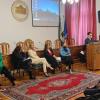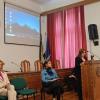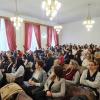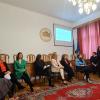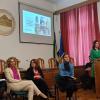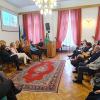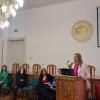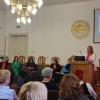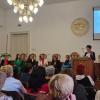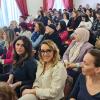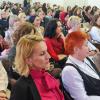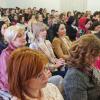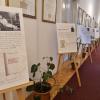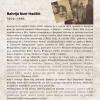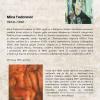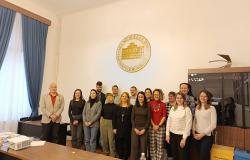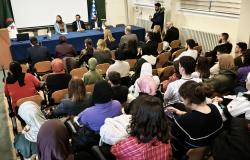Two exhibitions and a panel: “Bosnian female scientists, artists and athletes” on the occasion of 8 March at the University of Sarajevo
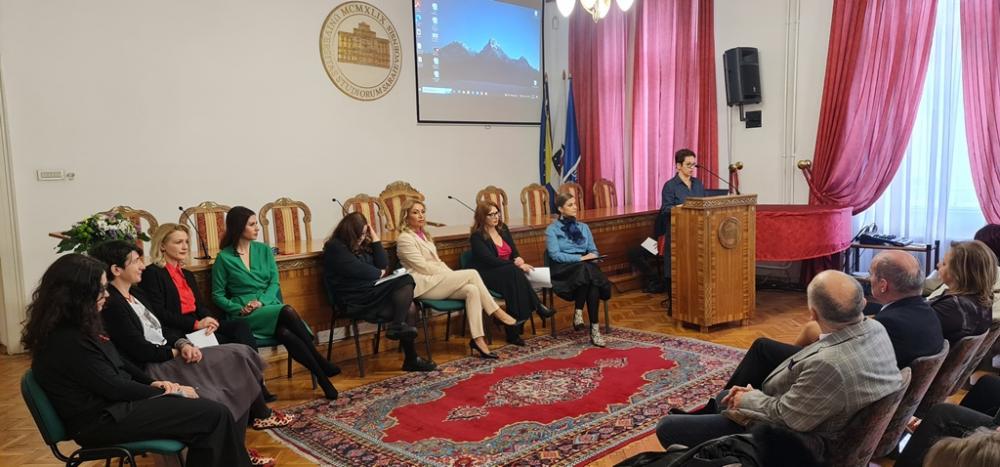
The Department for Arts, Arts Research, Culture and Sport, University of Sarajevo organized an event to mark 8 March called “Bosnian Scientists, Artists and Sportswomen,” during which visitors had the opportunity to attend a panel discussion and two exhibitions. . This year, in addition to the Service for Art, Art Research, Culture and Sports, the Service for International Cooperation and the Library of the University of Sarajevo joined the organization of the event.
At the panel discussion, the following spoke about women who were important figures in their fields of activity and who left an exceptional mark on Bosnian culture and history: Prof. Dr. Sarina Bakić, Prof. Dr. Lana Šehović, Prof. Dr. Fatima Hadžić, Prof. Dr. Lejla Šebić, Prof. Dr. Ajla Demiragić, Prof. Dr. Enita Nakaš, Prof. Dr. Tamara Karača Beljak and M.Sc. Nadina Grebović-Lendo. As part of today's event, the Minister of Science, Higher Education and Youth of Sarajevo Canton, Prof. Dr. Aleksandra Nikolić, University of Sarajevo Rector, Prof. Dr. Rifat Škrijelj, UNSA Vice-Rector For Art, Artistic Research, Culture And Sport, Prof. Dr. Tamara Karača Beljak and Vice-Rector for Research, Prof. Dr. Mirza Dautbašić.
The panel discussion started with the opening address by Prof. Dr. Sarina Bakić, who in her presentation answered the question of what 8 8 March represents today. “Although we should insist on gender equality every day, today is an important date in history and we should, precisely by marking it, and not by celebrating it, serve to remind ourselves of what this date actually indicates”, Professor Bakić pointed out. and added: “Contrary to the proclaimed idea of emancipation, an idea that is treated as a symbol of women's struggle for human dignity and economic independence, the very act of 8 March donation represents the humiliation of the fight for women's rights and the destruction of persistent defiance against social inequality and discrimination, and for the society of Bosnia and Herzegovina, it is important to emphasize against violence against women and children”, emphasized Professor Bakić.
Prof. Dr. Ajla Demiragić spoke on the topic From the first strikes to the commercialization of the International Women's Day - a brief historical overview of the long struggle of women for equality in society. “For more than twenty years, every 8 March, we remember what we have achieved, by having to prove ourselves every day. Exhibitions about the first among us are being organized again. I think it is very important to talk about what was happening in Bosnia and Herzegovina”, stated Professor Demiragić. Through her presentation, Professor Demiragić mentioned important historical moments and personalities, she mentioned the women who in Sarajevo, in Bosnia and Herzegovina, fought for their rights in the business environment. She spoke about the first strikes by women who were not afraid of the reaction of other people on the way to exercising their rights, especially in the context of history as we know it.
Prof. Dr. Amila Ždralović believes that nothing should be congratulated today, but celebrated, in honor of all those for whom today was declared Women's Day. She emphasized the importance of investment, both institutional and individual efforts, for the sake of realizing and promoting the true values of this day, and through the infographic that the attendees could see, Professor Ždralović quantitatively presented data on the number of men and women at the Faculty of Law of the University of Sarajevo, the number graduates and masters, both women and men, and then also about the number of doctoral students. With those numbers, she clearly indicated the increase in the number of women with academic titles and participation in the academic community, which is one of the goals of Women's Day.
The attendees were also addressed by Prof. Dr. Lana Šehović, professor at the Music Academy of the University of Sarajevo, who through her presentation presented the importance of women in the musical creativity of Bosnia and Herzegovina in the 19th century. The topic of Professor Šehović's presentation was female identity in the music world in Bosnia and Herzegovina. In this way, she presented one of the most important women who participated in the formation of the music world, specifically in Sarajevo, and that was Milena Mrazović, primarily known as a writer and journalist, but also a pianist. She especially emphasized that it was Milena Mrazović who was the first female composer in Bosnia and Herzegovina, whose piano compositions are the oldest sheet music in the history of Bosnia and Herzegovina.
Prof. Dr. Fatima Hadžić spoke about another extremely important woman in the history of Bosnia and Herzegovina. We are talking about Bahria Nura Hadžić, the first Bosnian prima donna, who built her career at the world level, back in the 1930s. Born in a respectable Sarajevo family, Bahrija Nuri Hadžić was educated in Belgrade and Vienna, performed at many European opera stages, and her career reached its peak in just ten years.
As part of the presentation on the topic “Invisible female athletes”, prof. Dr. Lejla Šebić pointed out that the successes of our girls and women athletes represent the wealth and uniqueness of this country, which should be emphasized, supported and celebrated. Equal salaries, sports contracts, scholarships, state support and media attention should be provided for our female athletes as for male athletes. . After completing their career, female athletes should be given the opportunity to work in management positions of sports organizations and clubs, selectors and coaching positions”. She also added that sport is an excellent platform for promoting gender equality and empowering girls and women. She also referred to the fact that, unfortunately, more focus is often placed on their femininity and sexual attractiveness instead of strength and skill, which contributes to the marginalization of female athletes' achievements.
The vice-rector for international cooperation of the University of Sarajevo, prof. Dr. Enita Nakaš, speaking about women who selflessly fight for development, progress, and equality in society, introduced Sofia Corradi (Mama Erasmus) - a woman who fought for thirty years for the Erasmus student exchange program to become and be accepted at universities. “She fought and fought for the results achieved at foreign universities to be recognized by male and female students at their home universities. Today, Erasmus+ has a budget of 26.2 billion euros”, said Vice-Rector Nakaš. She reminded that Erasmus (since 2014, Erasmus+) is an acronym for the European Region Action Scheme for the Mobility of University Students, and emphasized that Erasmus was founded by a woman, and that its logo, i.e. visual, is represented by the image of a man - Erasmus of Rotterdam.
“It is the duty of everyone in society to talk about and promote works done by women!”, Vice-Rector Nakaš emphasized.
Exhibition of the first author, M.Sc. Nadine Grebović-Lendo presented nine women from the history of Bosnia and Herzegovina. Among them are the first women writers, painters, opera divas, journalists, doctors, teachers, editors and others who were born or came to live and create in Bosnia and Herzegovina.
Exhibition of the Library of the Faculty of Law of the University of Sarajevo, whose authors are prof. Dr. Amila Ždralović and M.Sc. Mirela Rožajac-Zulčić presented monographic publications by scientists from this faculty and an interesting infographic with statistical data on education in Bosnia and Herzegovina and at the University of Sarajevo - Faculty of Law.




